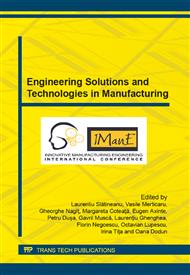p.901
p.906
p.911
p.916
p.921
p.926
p.931
p.936
p.941
Improving Organizational Performance through the Use of the EFQM Excellence Model
Abstract:
Achieving quality depends on how the company works, planning and control processes are essential for satisfying customers and other stakeholders. In this respect, more companies are turning to systems of excellence that allow the organization to identify problems and help them implementing improvement measures needed for development. The analysis developed in this paper aims is to examine the main processes carried out at a sugar factory by the way they are planned, managed and controlled, through the criterion – Processes- of the EFQM excellence model. The study is focused on an economic analysis of the main financial indicators of the company, in order to highlight its current situation. Applying the criteria -Processes - of the EFQM model the company can analyze its processes and it can establish improvement measures that may be applied.
Info:
Periodical:
Pages:
921-925
DOI:
Citation:
Online since:
October 2014
Authors:
Keywords:
Price:
Сopyright:
© 2014 Trans Tech Publications Ltd. All Rights Reserved
Share:
Citation:


